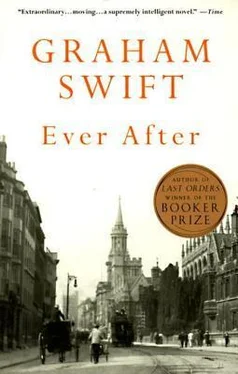None of this, perhaps, would have had such far-reaching effects on Matthew, were it not for the peculiar vividness of his mother’s personality and for the fact that she died suddenly when he was only eleven and she was thirty-two, so that her memory became a shrine for all his religious feeling. At an early age there was cruelly brought home to him religion’s intricate connection with mortality. The Bible would remain for him the sole consolation for his mother’s inexplicable departure, the only true reply to death. Though, for all his early training, he does not seem to have been able to sustain the same trauma from the opposite end: the death in 1854 of his son Felix, aged two. Rather, this heralded the collapse of Matthew’s spiritual certainty. However, by this time Matthew would have retained not only the undimmed memory of his mother but the memory of his encounter with an ichthyosaur.
His mother’s death would also have made clear to Matthew, if he did not guess it already, that his father had married not just as a means to material advancement. Until in later life he succumbed increasingly to drink, John Pearce does not seem to have been given to extravagant displays of emotion. But his son must have perceived what was seldom voiced: John did not remarry; grief became an abiding fact of his life. And it must have dawned on Matthew sooner or later that the loss of his mother was the beginning of his father’s own gradual abandonment of his faith.
One result of his bereavement might have been John Pearce’s return to the chapel. He turned, rather, to the world. He was the former industrious apprentice who had assiduously bettered himself so as to run his own modest workshop and his own modest household: it now meant everything to him that the amelioration should be continued in his son.
Only some intuition of the inner motive at work could have kept young Matthew from rebelling against the cajoling, insistent overseer his father must have become. It was all a form of tribute — a mutually binding tribute to his dead mother. On that basis Matthew would have learnt to serve rather than resent his father. He would have understood the responsibility placed upon him and grown up with a sense of obligation and duty as springing from some tenderer source than mere obedience. His appetite for knowledge would have been released and, behind all the paternal coercion, blessed. And all this would have reached its apogee on that day when, against all the laws of social expectation (though his father was now operating a thriving business and his clocks were sought after by the local gentry), a place was secured for him at Oxford. His father’s features, so long the stern features of a determined taskmaster, must have at last allowed themselves a broad, proud grin.
And now, as Oxford recedes behind him, Matthew imagines the scene of his homecoming. His father will be waiting in the market square. He will not be cowed by his son’s attainments, nor parade them too vainly before his neighbours; but nor will his son be cowed any more by his once overbearing father. They will greet each other amicably, as equals. In the White Hart they will clink glasses (one Methodist pledge John has long abjured), and Matthew will be aware of a sense of mission fulfilled.
What he will not be aware of, not until, years later, he confides the realisation to his notebook, is that while it is he who has enjoyed the benefits of education, it is really his father who is the more free-thinking, the more forward-looking and certainly the more calculating. It is John who, adroitly exploiting the connections of his clockmaker’s clientele, has secured for Matthew (he will start next month) a position with the Exeter firm of Westbrook and Cross, newly appointed consultants to the Bristol and Exeter Railway. And it will be John who, some four years later, will write to his son, pointing out that one Robert Makepeace, a crusty soul who runs a surveyor’s business in Tavistock and has so far found no junior partner to his permanent liking, is ailing and contemplating retirement. Tavistock is not Exeter, and a partnership in the Exeter firm is almost guaranteed, but now that the Bristol and Exeter was complete, the railway would forge its way westwards across the county to Plymouth: Matthew, with all his experience, would be well placed. And, as Matthew surely knew, Tavistock was no longer a sleepy market town: the talk now was all of copper mining. Here was an opportunity for Matthew not only to acquire a business of his own but to extend his experience into new fields.…
The coach rocks and trundles on through the long, midsummer day, through the drowsy heart of England. As evening sculpts the hills of Somerset, it rattles into the honey-stoned, eighteenth-century city of Bath. Matthew’s graduate companion, who has tried him all day with his stabs of wit, proposes a night’s dissipation—“one last bachelorly bout before we wed the stern bride of the future.” Matthew resists the wilder suggestions in the proposition but submits to supper and a good deal of claret before his companion finally takes his leave — whether to some house of the night or to the clutches of a guardian aunt, Matthew cannot be sure.
He goes to bed drunk. Upsets a candle. It would be like him, the next morning, to be a little ashamed of his behaviour. Nearly twenty years later, recalling, with some wistfulness, the days when his father’s abstinence was total, he will remember his saying, as they passed some grinning, lolling drunkards in a Launceston street: “They have swallowed the devil and now he makes them feel pleased.” But now, standing at his inn-chamber window, open to a starry sky, feeling the lift of the world beneath him like the pitch of a ship, he cannot resist a certain festive mockery of his own inner seriousness. We are not who we think we are, only figures in some eternal, amoral masque.…
There is a strong conservative streak in Matthew’s nature — an instinct, for all his inquisitiveness, for not looking too far about him, or looking only at what he wishes to see; and a tendency, for all his self-reliance and capability, to take a good deal for granted. During his spell at Oxford, the Tractarian question has been raging; but there is no evidence that, young man of religious conviction, he interested himself in the turmoil of an old Church facing new times. Nor, while he was at Oxford, does he seem to have pursued, though the opportunity was there, those areas of scientific debate which in later life he would grapple with for himself, as if they were new.
He sees himself as setting out to take his place in an advancing (if essentially unalterable) world: it is really his father who will have put him there. He thinks he has decided, himself, on his future profession: it is really his father, with his own instinct for not setting his sights too high, who has chosen it for him. And though John Pearce is no gambler (one Methodist vow he has not abjured) and would frown at his son’s forsaking the noble duty of Work so far as, for example, to dabble in railway or mining shares, Matthew would be astonished that his father’s dreams for him, if only when under the influence of brandy, extend beyond his becoming merely an accomplished, successful surveyor for the rest of his life.
It might also be claimed that there is in Matthew’s nature a strong capacity for happiness. Contentment, at least. A man who likes to think — and who does not like to think. Who has time for ideas but is peculiarly at home in the world of things. Who has no sense of his own importance but no vague notions, either, of his own abilities. Who has no airs and graces but a natural social ease — he is at home with people too. Who has the knack of knowing and not knowing.
Look at him now as, his journey resumed, the coach bears him onwards. Look into this bluff, obliging, earnest, amiable, in no way special face, which combines, right now, the stolidity of a man twice his age and the innocent glee of a child released from school. He has — he doesn’t know it yet — depths.
Читать дальше












